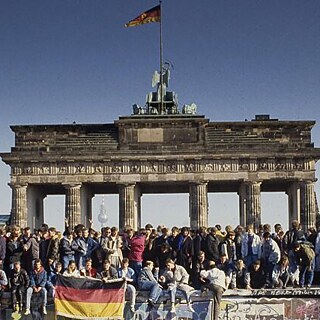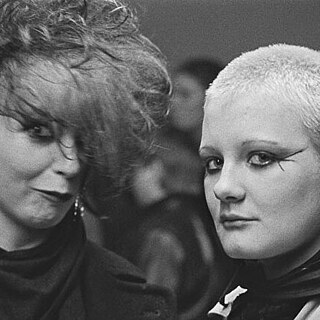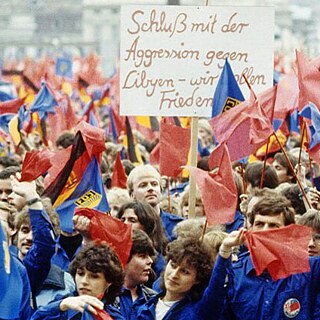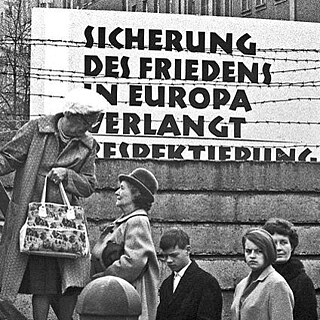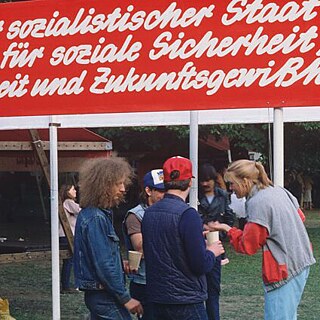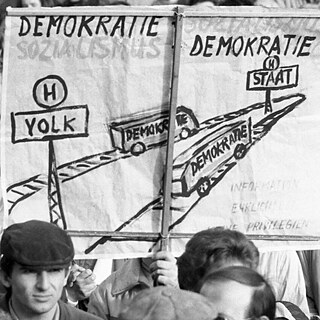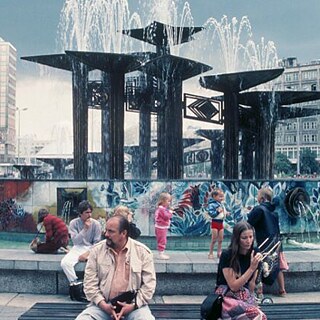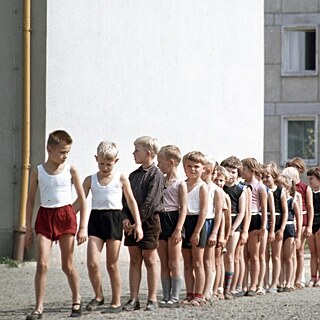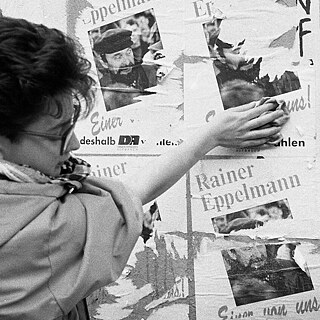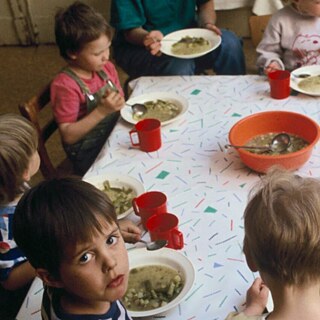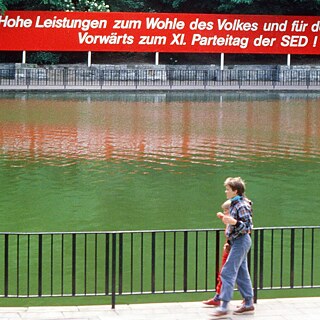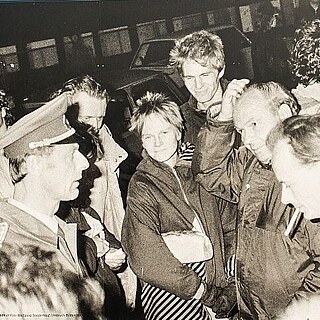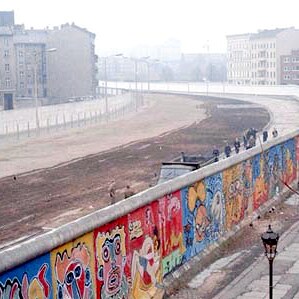
Show description in:
Chapter 16Commonalities and differences FRG vs GDR: Race/Racism

East Germany turned anti-racism into state-policy, i.e. it outlawed racism out of existence, but did it really erase racism?
Characteristics
Language level
Target group
Skill

Part of the series Divided Germany, the wall and reunification
27 materials
Description
East Germany turned anti-racism into state-policy, i.e. it outlawed racism out of existence, but did it really erase racism? How did GDR officials define “anti-racism?” Why was Angela Davis a celebrity in the East? How did Socialist Globalization shape the way East Germans thought about difference? What accounts for the racially motivated violence after 1990, particularly in the East? How has the history of colonialism, the Holocaust, Antisemitism and Islamophobia influenced discourses on race and racism in both countries, before and after Reunification? Is race and racism as important to the German public discourse as it is in the US?
Videos and worksheet
1. SOLIDARITY FOR ANGELA DAVIS
Did you know that Angela Davis aquired an almost celebrity status in East Germany and that thousands of young people wrote letters of solidarity to support her release from prison?
2. RACE AND HISTORY
How has the history of Fascism, Holocaust and Antisemitism influenced thinking about race in both states, East and West Germany?
3. WHAT IS AN ANTI-RACIST SOCIETY?
Is there a different between anti-racist and non-racist societies? Why is “race literacy” important?
4. RACE IN THE CAPITALIST WEST AND SOCIALIST EAST
What was the status of race in the socialist world? Was Socialism free of racism?
5. EAST GERMAN SUBCULTURES AND RACISM
Why did youth subcultures in East Germany question the antifascist position of the GDR?
6. GDR'S ANTI-RACISM POLICY
East Germany turned anti-racism into state-policy. What did GDR officials understand under “anti-racism”?
7. ANTI-RACISM
What country was more anti-racist? East or West Germany?
8. POC IN WEST AND EAST GERMANY
Where would East Germans have met POC? What about West German “guest workers?”
9. FOOTAGE OF RACIAL DIFFERENCE
Despite their visible presence, foreign guest workers from Cuba, Vietnam, and Mozambique in the GDR were largely isolated and invisible. See if you can spot the only footage of racial difference shot in the GDR within the 415-hour Open Memory Box collection. Where does this footage appear?
10. AFTER REUNIFICATION: RACIALLY MOTIVATED VIOLENCE IN THE EAST
If East Germany (GDR) was racism-free, what accounts for racially motivated violence after 1990?
11. COLONIALISM AND THE HUMBOLDT FORUM
Dr. Noa K. Ha discusses the controversy around the Humboldforum, one of Europe`s most ambitious cultural projects envisioned to be built on the ruins of the Palace of the Republic, GDR`s former highest seat of power.
12. THE COLONIAL PAST IN GERMAN PUBLIC DISCOURSE TODAY
Mahdis Azarmandi, PhD, grew up in Germany in the 90ies. What did she learn about Germany's colonial past? And how present is this past in the German public discourse today?
13. DECOLONIZATION: WHAT DOES THAT MEAN?
Decolonization has become a buzz-word in recent times, but what does it mean? Hear decolonial scholar Mahdis Azarmandi's thoughts on the term.
14. GERMAN INTEREST IN DISCUSSING RACISM
Mahdis Azarmandi, PhD, discusses how comunities of color have historically tackled racism in Germany and why she is hopeful about the new anti-racist solidarities that are emerging at the present moment.
PARTNERS
Bundesstiftung Aufarbeitung der SED-Diktatur (Federal Foundation for the Reappraisal of the SED Dictatorship), German Consulate General New York, German American Partnership Program (GAPP), American Association of Teachers of German (AATG), Transatlantic Outreach Program (TOP) and Spark for German.
Videos and worksheet
1. SOLIDARITY FOR ANGELA DAVIS
Did you know that Angela Davis aquired an almost celebrity status in East Germany and that thousands of young people wrote letters of solidarity to support her release from prison?
2. RACE AND HISTORY
How has the history of Fascism, Holocaust and Antisemitism influenced thinking about race in both states, East and West Germany?
3. WHAT IS AN ANTI-RACIST SOCIETY?
Is there a different between anti-racist and non-racist societies? Why is “race literacy” important?
4. RACE IN THE CAPITALIST WEST AND SOCIALIST EAST
What was the status of race in the socialist world? Was Socialism free of racism?
5. EAST GERMAN SUBCULTURES AND RACISM
Why did youth subcultures in East Germany question the antifascist position of the GDR?
6. GDR'S ANTI-RACISM POLICY
East Germany turned anti-racism into state-policy. What did GDR officials understand under “anti-racism”?
7. ANTI-RACISM
What country was more anti-racist? East or West Germany?
8. POC IN WEST AND EAST GERMANY
Where would East Germans have met POC? What about West German “guest workers?”
9. FOOTAGE OF RACIAL DIFFERENCE
Despite their visible presence, foreign guest workers from Cuba, Vietnam, and Mozambique in the GDR were largely isolated and invisible. See if you can spot the only footage of racial difference shot in the GDR within the 415-hour Open Memory Box collection. Where does this footage appear?
10. AFTER REUNIFICATION: RACIALLY MOTIVATED VIOLENCE IN THE EAST
If East Germany (GDR) was racism-free, what accounts for racially motivated violence after 1990?
11. COLONIALISM AND THE HUMBOLDT FORUM
Dr. Noa K. Ha discusses the controversy around the Humboldforum, one of Europe`s most ambitious cultural projects envisioned to be built on the ruins of the Palace of the Republic, GDR`s former highest seat of power.
12. THE COLONIAL PAST IN GERMAN PUBLIC DISCOURSE TODAY
Mahdis Azarmandi, PhD, grew up in Germany in the 90ies. What did she learn about Germany's colonial past? And how present is this past in the German public discourse today?
13. DECOLONIZATION: WHAT DOES THAT MEAN?
Decolonization has become a buzz-word in recent times, but what does it mean? Hear decolonial scholar Mahdis Azarmandi's thoughts on the term.
14. GERMAN INTEREST IN DISCUSSING RACISM
Mahdis Azarmandi, PhD, discusses how comunities of color have historically tackled racism in Germany and why she is hopeful about the new anti-racist solidarities that are emerging at the present moment.
PARTNERS
Bundesstiftung Aufarbeitung der SED-Diktatur (Federal Foundation for the Reappraisal of the SED Dictatorship), German Consulate General New York, German American Partnership Program (GAPP), American Association of Teachers of German (AATG), Transatlantic Outreach Program (TOP) and Spark for German.
